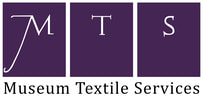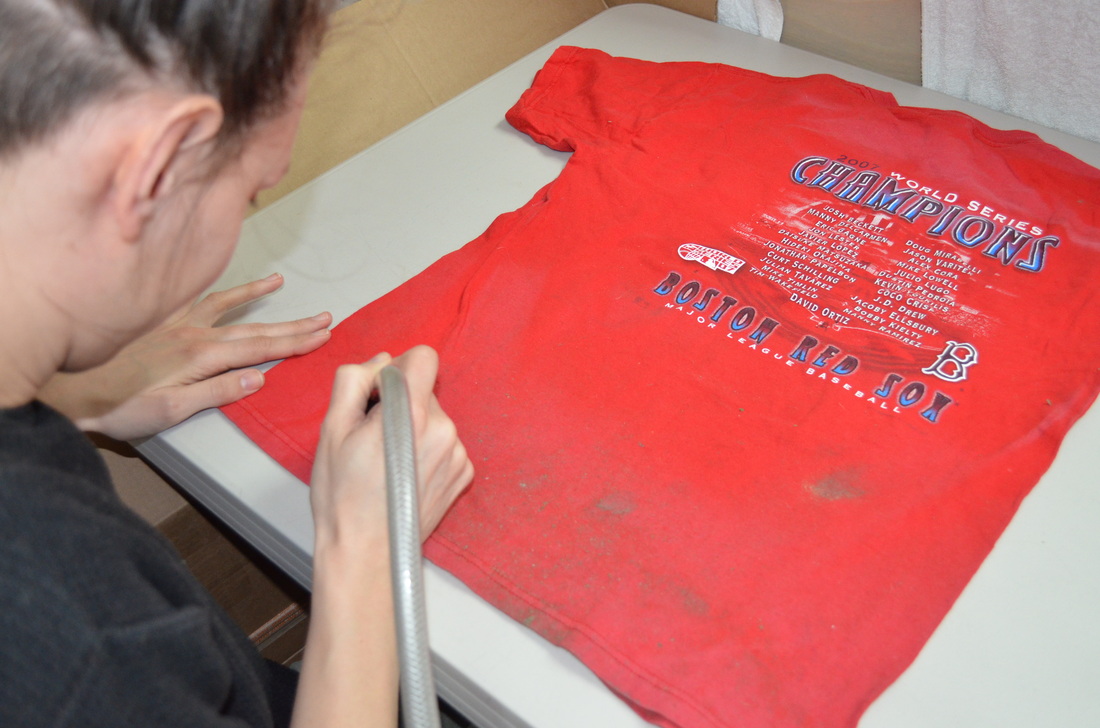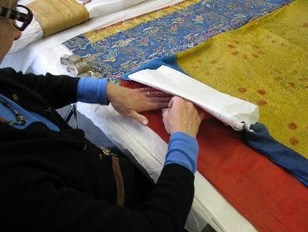|
FOR IMMEDIATE RELEASE Andover, MA. – Museum Textile Services recently completed the conservation of nineteen artifacts left at the makeshift memorial created immediately after the Boston Marathon Bombing in 2013. To mark the one-year anniversary, a selection from among the thousands of items left at the original memorial will go on display at the Boston Public Library in Copley Square. “Dear Boston: Messages from the Marathon Memorial” will open on April 7, 2014, steps away from the finish line of the Boston Marathon. The exhibit is organized by #BostonBetter, a volunteer organization of cultural heritage professionals and institutions that came together to commemorate the events of the marathon bombing, honor those who were lost, and help the community continue to heal in the aftermath of this tragedy. Camille Myers Breeze, Director of Museum Textile Services, was approached in May of 2013 to participate in a voluntary effort to preserve artifacts left at the temporary memorial site. “Memories of the minutes and days following the bombing were still so vivid when we were asked to be a part of this effort,” Camille said. “But I was drawn to the idea of telling the story of the attack in a way that acknowledges the initial emotional response but also reflects our hope and strength.” In March, 2014, Museum Textile Services Technician Josephine Johnson retrieved nineteen artifacts from the Boston City Archives. The hats, shirts, baby onesies, and Starbucks apron were all inscribed with messages from often anonymous donors. “Over the course of the last three weeks, our staff documented, photographed, surface cleaned, humidified, and gently straightened the artifacts,” Camille said. “We removed any deterioration products, such as bird droppings, that could negatively impact the preservation and exhibition of the objects.” Each of these artifacts will be displayed in the exhibition “Dear Boston: Messages from the Marathon Memorial” at the Boston Public Library. The exhibit opens on Monday, April 7, 2014 at 11:00 a.m. and runs through Sunday, May 11, 2014. “We are deeply honored to be a part of this project and are looking forward to seeing the exhibition at the opening,” said Camille. “Like everyone involved in this project, we hope this exhibition will remind everyone who visits of the outpouring of love and support we as a community received last year. This exhibition is just the first step as we move forward together.” About Museum Textile Services
Museum Textile Services, the premier textile conservation studio in New England, specializes in the preservation of fabric-based materials for cultural institutions and individuals. Museum Textile Services documents, cleans, stabilizes, and mounts historic textiles. Through educational programs and outreach initiatives, Museum Textile Services teaches individuals and cultural heritage institutions how to ensure better preservation of their textiles. For more information, visit www.museumtextiles.com. ###
0 Comments
FOR IMMEDIATE RELEASE
Sampler Study Day, January 26, 2013 Sponsored by the Peabody Historical Society & Museum Textile Services December 18, 2012 – The Peabody Historical Society of Peabody, Mass. and Museum Textile Services of Andover, Mass. will host a Sampler Study Day at the Historical Society's Smith Barn at 38 Felton Street, Peabody on Saturday, January 26, 2013 from 10-12. This event is for individuals who own antique needlework samplers and pictorial embroideries and would like to learn more about the condition, significance, and proper care of these textiles. Members of the public are invited to bring their samplers to the Society's Smith Barn on Sampler Study Day for a professional evaluation. The fee to participate in this program is $20 per sampler. Camille Myers Breeze is a textile conservator with over 20 years of experience in the field. She is the founder and director of Museum Textile Services, a full-service textile preservation studio providing conservation, collections management and outreach for collectors and institutions. Breeze will evaluate the condition of each sampler brought to the event and provide participants with a one-page conservation worksheet. She will also discuss potential conservation issues and make recommendations for the appropriate mounting and framing of these heirlooms. Peabody Historical Society Curator Heather Leavell and Assistant Curator Lyn FitzGerald will share information related to the age, decorative motifs, and overall style of each sampler. They will also provide resources for researching the history of a sampler's maker. To ensure the long-term preservation of these textiles, Leavell and FitzGerald will advise participants on the proper care of samplers, including optimal storage and environmental conditions. Additionally, Museum Textile Services staff will be available to help participants complete a short survey to include their samplers in a searchable online database administered by the National Society of the Colonial Dames of America (www.nscda.org). The goal of the NSCDA Sampler Survey is to inventory all extant samplers and pictorial embroideries in museums and private collections to promote the preservation and study of this important art form. Samplers and pictorial embroideries were a popular form of needlework in America between the 17th and 19th centuries, and were often produced by schoolgirls and young women as a demonstration of their skill in this domestic art. Today, these textiles provide valuable information about the social and cultural history of women during this period. Samplers may feature the alphabet; religious or moral quotations; decorative figures, motifs and borders; and sometimes the name of the maker and the date of creation. To attend Sampler Study Day please register by contacting Heather Leavell at the Peabody Historical Society at 978-977-0514 or [email protected] by Wednesday, January 23, 2013. Drop-ins are welcome and will be accommodated as time permits. The Peabody Historical Society's Smith Barn is conveniently located off of Route 114, near the NorthShore Mall. For directions and other information, visit www.peabodyhistorical.org, or call 978-977-0514. Andover, Mass. – Museum Textile Services will turn over the last of 18 Tibetan thangkas to the Mead Art Museum at Amherst College next month. The thangkas – cloth paintings depicting Buddhist deities and symbols, sewn into fine silk textiles – were the focus of a two-year conservation project. Picturing Enlightenment: Thangkas in the Mead Art Museum at Amherst College will open August 26, 2011. This will be the first time the thangkas have been seen by the public since 1953. To protect these fragile objects from the potentially damaging effects of light, the collection will be displayed in two parts. The first group of 10 thangkas will be on view from August 26, 2011 to January 1, 2012. To accommodate the careful exchange of the works, the exhibit will close briefly and the remaining eight thangkas will be displayed from January 20 to June 3, 2012. Camille Breeze, Director of Museum Textile Services was thrilled to work with the staff at the Mead Art Museum. “In April 2009 Collections Manager Stephen Fisher called us to survey the collection of thangkas. As a part of that process, we examined each piece, took extensive photographs and recorded measurements, construction details and current condition. The thangkas had been in archival storage for several years and were extremely fragile. When Elizabeth Barker, Director and Chief Curator, discovered the thangka collection, she really wanted to make them accessible – first through an exhibition and then later for study.” A few months later, the thangkas made their way to Museum Textile Services, where they were gently cleaned, the painted surfaces stabilized and the silk supports reinforced. “We cleaned the thangkas with a gentle hand vacuum and vulcanized rubber sponges that absorb and remove a lot of the dirt and grime that accumulates over time. The thangkas were covered in an oily residue, which is probably from the traditional yak butter lamps used in Tibetan culture,” said Camille. “We took a lot of time reinforcing the silk supports to ensure that the thangkas would not be damaged when they are exhibited this fall.” This August, the last of the thangkas will be returned to the Mead Art Museum. "We have really enjoyed learning about the thangkas and Tibetan Buddhism," said Camille. "From a conservation perspective, this project had a lot of exciting challenges. Thangkas consist of two distinct components - the painting and the textile boarder - that are conserved in two very different ways. It allowed our team to draw upon all of our skills as conservators." About Tibetan Thangkas Thangkas function as objects of Buddhist meditation. They are also used as teaching aids and serve as a visual recording of history. Each thangka has a central painting surrounded by a fabric mount, usually made of Chinese silk. This fabric can become damaged over time from rolling, moisture, light exposure and the weight of the hanging thangka. Many thangkas have a silk veil that hangs over the image and can be raised and held in place by a silk cord for viewing. The images depict Buddha, bodhisattvas, other deities or eminent monks. The deliberately conservative artistic styles and iconographic forms used by painters of thangkas have changed little over the course of this thousand-year tradition. During the painting process, the artist performs specific rights. At its completion, a consecration ceremony called the "opening of the eyes" ensures that the resulting image is an accurate reflection of the deity depicted. Most of the thangkas in the Mead's collection were commissioned for a single monastery in Lhasa, Tibet. Religious leaders specified the paintings' subjects and the completed thangkas were displayed in groups, sometimes numbering more than one hundred in a single room. About the Mead Art Museum
The Mead Art Museum houses the art collection of Amherst College, totaling more than 16,000 works. An accredited member of the American Association of Museums, the Mead participates in Museums10, a regional cultural collaboration. During the academic term, the museum is open Tuesday through Thursday and Sunday from 9 a.m. to midnight and from 9 a.m. to 5 p.m. Friday and Saturday. For more information, including a complete schedule of events, all free and open to the public, please visit the museum’s website. About Museum Textile Services Museum Textile Services, the premier textile conservation studio in New England, specializes in the preservation of fabric-based materials for cultural institutions and individuals. Museum Textile Services documents, cleans, stabilizes and mounts historic textiles. Through educational programs and outreach initiatives, Museum Textile Services teaches individuals and cultural heritage institutions how to ensure better preservation of their textiles. Accompanying Image A high resolution copy of the image included above can be downloaded here. |
Press Contact
Camille Breeze Categories
All
Subscribe to RSS Feed
|



 RSS Feed
RSS Feed